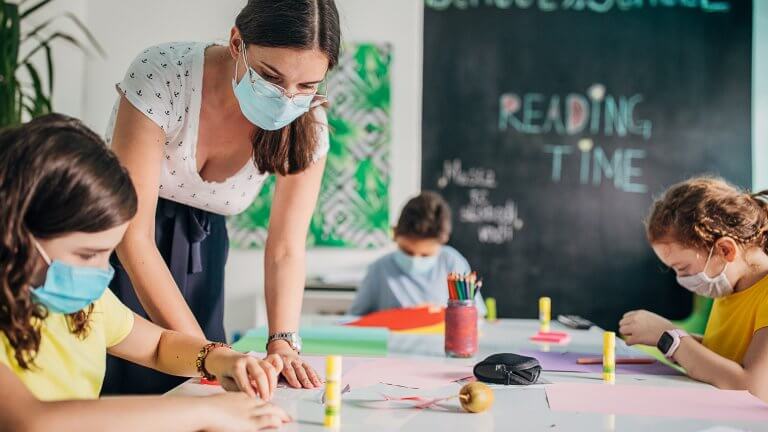Let’s be honest, it’s been a really hard year for most of us, and an exceptionally hard school year for educators. Educators have been on the frontlines of the pandemic, helping their students through the toughest parts, providing resources, safe spaces to vent, of course a continued education, even if it had to be virtual.
With increased vaccine distribution throughout Texas and the country, and with the end of the school year and summer break on the horizon, we wanted to hear from our community about what they’ve learned this year. Whether it’s harsh truths or useful strategies, we asked educators to tell us themselves what they’ve learned throughout this year.
We got all types of answers from new skills learned to painful lessons learned about online teaching. What remained consistent throughout was the flexibility required by educators throughout the country, the growing need for knowledge and support on remote learning, and the benefit of being proactive not just reactive.
Read below what our community members said, and drop what you’ve learned this year in the comments below! Check out our previous series too on how educators are teaching through the pandemic.
Flexibility and change can be hard, but important
I am more aware than ever of the need for flexibility and creativity in education. Everyone has learned new computer skills. Without support of colleagues the transition to virtual classrooms would not have been possible for some of us. Sharing and caring is critical. As a counselor, I am certain the personal connections with students along with awareness of S.E.L. strategies helped us reach students and families. One of my main focuses as a counselor has been student and staff wellness. Using surveys to identify needs and participating in a Student and Staff Wellness has been my special focus this year.
Wendy Woodruff
Counselor–Gilbert Elementary
I have learned to be comfortable with being uncomfortable. Each day has brought new challenges so we must be flexible and understanding as we go through our day. We must be considerate of others and the impact that the pandemic has had on those around us.
Dr. Brenton White
Superintendent/ A+ Charter Schools
Honestly, I don’t think we (education system) was ready for a pandemic. It is something new and includes change. Change is scary to so many students, parents and educators. You do the best you can but it’s not easy and is stressful! I continue to be as routine as I can with my position. I do miss the human contact with my volunteers, parents and students. That human contact makes a big difference. It has been harder to get a hold of students due to wrong phone numbers, address changes and wrong emails. We did the best we could out of this situation.
Adriana Guerra
Parent Specialist/Attendance/McKinney Vento/Clerk
Building relationships is critical
The only way we’ve been able to make virtual learning work by building better relationships with our students and their families. We can’t do it alone, so we’ve made more phone calls, sent more emails and done more home visits than ever before. Even so, we’ve all had to embrace our limitations and failings.
As a whole education is continuing to be responsive and not proactive to the changing educational landscape.
Cori
I have really learned to hone my focus on what will make the biggest positive impact on teaching and learning. There may be many more things on the to-do list that have to get done, but they do not all have to be done with excellence. It is important to conserve energy and mental bandwidth for the tasks that have the greatest impact. Also, the additional attention to detail required by preparing safe spaces and contact tracing has made us take a critical look at how we can improve the efficiency of some of our systems.
Elizabeth DeFrancisis
Assistant Principal, Bill Burden Elementary, LHISD
I worked the first semester of 2020. I observed Covid -19 impact learning for both teachers, students, parents and administrators in an overall negative way. Communication was imperative. Keeping parents updated via parent newsletters and parent info Portals as well as phone calls became crucial to student success. When teachers are asked to do something that has never been done before, Central office staff must put themselves in those staff shoes by teaching classes to understand what they are going through but the most significant strategy is human face to face contacts with your teachers and principals to take temp on staff mental health and to provide positive walkthroughs.
These walkthroughs are to look only for the strengths. Including asking students specifics regarding their teacher strengths as well as parents. Lastly special Ed students choosing learning from home should have teachers and aides conducting required weekly academic and mental health check-ins to include a 1 x month face to face with student and parent to ensure continued student learning. No news is bad news if you get it in time.
Dr. Patricia A.Alford
Technology is great…until it’s not
I have learned that as instructional leaders we had to make immediate changes to the typical manner by which we serve our teachers and students. Technology driven instruction requires a great deal of forethought and planning in order to create instruction that is relevant and purposeful.
Instructional Support Teacher
That is it difficult to do both remote teaching and on-campus teaching at the same time. Doing either one by itself is much easier to do. Also, things are really hard when the technology is unreliable.
Karen Horak
3rd Grade ELA/Social Studies Teacher at Granger ISD
Peardeck, Schoology, lots of new google tricks, to have grace with teachers and students
Laura Stegall
That sometimes less is more. With technology everything can be bigger and brighter, it’s easy to go down the rabbit hole of making everything perfect and lose sight of the content that is truly important.
Ruth
Music Teacher
A lot… how to do teletherapy, Zoom, Blend. I learned a lot about how to use technology and online resources to help my students.
SLP
AISD
I know I was not prepared for the technical requirements of the virtual learning world. Keeping the kids engaged was extremely challenging.
Linda Morales
Instructional Facilitator/Alice ISD
Cole Bubenik is a Content Marketing Specialist here at Region 13.





Add comment